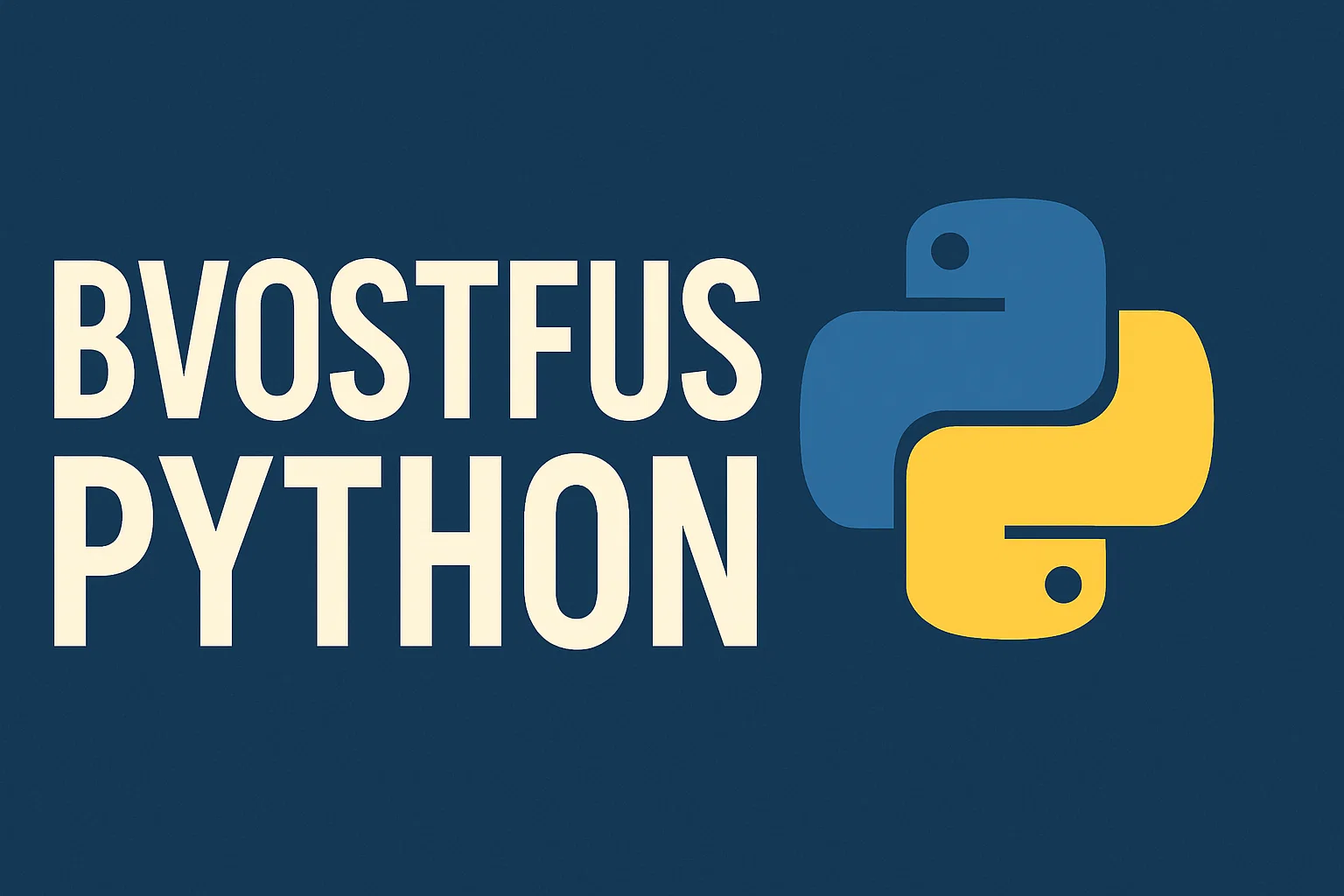Blog
The Ultimate Guide to bvostfus python: Transforming Modern Python Development

Python has long been known as one of the most powerful and versatile programming languages in the world. Its simplicity, readability, and vast ecosystem of libraries have made it the backbone of countless applications — from data science and artificial intelligence to web development and automation. But as the demands of modern software development grow, developers are constantly looking for tools and frameworks that make Python even more efficient. One such emerging concept that’s drawing attention is bvostfus python.
Though relatively new, bvostfus python has started making waves among developers for its promise to redefine how Python projects are structured, optimized, and deployed. In this article, we’ll explore what bvostfus python is, how it works, its potential benefits, and why it could be the next big step in Python’s evolution.
What is bvostfus python?
bvostfus python is an emerging approach, framework, or toolkit designed to modernize and unify Python development practices. While it’s not yet an officially standardized or widely released library, the idea behind bvostfus python is simple — to combine all the essential parts of Python development (like setup, formatting, testing, debugging, and deployment) into one streamlined workflow.
Instead of juggling multiple tools such as Black, Flake8, Pytest, Poetry, and Virtualenv, bvostfus python aims to bring them together in a single, cohesive environment. This creates a faster, cleaner, and more productive development experience.
The concept also focuses on fully embracing modern Python features, including type hints, async/await syntax, pattern matching, and compatibility with Python 3.10+ and beyond. The result is a system that allows developers to write cleaner, more efficient code that’s ready for today’s complex software ecosystems.
The Philosophy Behind bvostfus python
At its core, bvostfus python promotes a philosophy of efficiency, scalability, and simplicity. Traditional Python projects often rely on multiple external dependencies, each with its own configuration and quirks. Over time, this can make projects harder to maintain, especially as teams grow or new developers join.
The bvostfus python philosophy suggests that a unified framework can solve these pain points by:
- Reducing setup complexity with a single configuration file.
- Ensuring consistency across projects through standardized project templates.
- Integrating development, testing, and deployment workflows in one ecosystem.
- Optimizing runtime performance through modular execution paths.
- Supporting cutting-edge Python syntax and best practices by default.
In essence, bvostfus python wants to make the developer’s life easier — not by reinventing Python, but by simplifying how we build with it.
Key Features of bvostfus python
While the exact implementation may evolve, the bvostfus python concept revolves around several key features that set it apart from traditional workflows.
Unified Command Line Interface
One of the standout ideas behind bvostfus python is a single, powerful CLI tool — something like bvostfus init, bvostfus run, or bvostfus deploy. With such a tool, developers can initialize projects, run tests, manage dependencies, and even deploy applications without needing multiple external tools.
Centralized Configuration
Instead of managing several config files like requirements.txt, .flake8, pyproject.toml, and pytest.ini, bvostfus python introduces one unified configuration file — possibly named .bvostfus.yml or .bvostfus.toml. This file would control all aspects of a project, from dependencies to build settings.
Modern Python Compatibility
bvostfus python is built around Python 3.10 and newer. This means native support for type hints, pattern matching, and asynchronous programming — making it a perfect fit for scalable web apps, APIs, and data processing pipelines.
Modular Architecture
Developers can enable or disable specific modules depending on their project type. Whether you’re building a data-driven application, a REST API, or an automation script, you can choose only the tools you need. This modular design helps keep projects lightweight and efficient.
Built-in Testing and Linting
Testing and code quality checks are built into the bvostfus python workflow. That means you can run tests or check for style issues directly from the main tool, reducing the need for additional setup.
Performance Optimization
Some developers claim that bvostfus python can introduce JIT-style optimizations or hybrid execution paths that improve performance. While this remains to be seen, the focus on performance suggests that the framework isn’t just about convenience — it’s also about speed.
Why Developers Are Talking About bvostfus python
Developers are always on the lookout for tools that make their lives easier. bvostfus python appeals to both individual developers and teams for several reasons.
Simplified Workflows
Managing multiple dependencies, virtual environments, and configurations can become overwhelming. bvostfus python simplifies everything by consolidating common tasks under one roof, saving time and reducing errors.
Faster Project Setup
Instead of spending hours setting up a new project structure, developers can use bvostfus python to initialize a new app in seconds with a single command. This standardization also helps maintain consistency across projects.
Better Collaboration
For teams, having a unified development environment eliminates “it works on my machine” issues. Everyone follows the same standards, making onboarding and collaboration much smoother.
Enhanced Performance
Even if performance gains are modest, a more optimized runtime and modular architecture can make a significant difference in large-scale projects or systems that handle heavy workloads.
Future-Proof Design
By focusing on modern Python syntax and technologies, bvostfus python ensures that developers aren’t stuck using outdated patterns or legacy tools. It’s a framework built for the future of Python development.
How bvostfus python Compares to Traditional Python Development
To better understand why bvostfus python is gaining attention, it helps to compare it to the traditional approach to Python development.
| Aspect | Traditional Python Workflow | bvostfus python Approach |
|---|---|---|
| Setup Time | Requires multiple tools and configurations | Single-command project setup |
| Configuration | Multiple files for each tool | One unified config file |
| Code Quality Tools | Separate linters, formatters, and test runners | Integrated quality and test tools |
| Modern Features | Manual setup for async, type hints, etc. | Built-in modern syntax support |
| Performance | Depends on external optimizations | Potential built-in optimization engine |
| Collaboration | Inconsistent environments | Standardized project structure |
This unified structure can dramatically improve productivity and reduce human error, especially for growing teams and complex projects.
Getting Started with bvostfus python
If you’re curious about trying bvostfus python, you can begin by exploring available guides or repositories that discuss the concept. While it may not yet have an official PyPI package, several blogs and tech communities have started sharing early resources.
Here’s how you might experiment with it once a stable release is available:
- Install the CLI: Run a command like
pip install bvostfus(when it becomes available). - Initialize a Project: Use
bvostfus init my_projectto generate a ready-to-use structure. - Configure the Project: Edit
.bvostfus.tomlto define dependencies, test settings, and modules. - Run Development Commands: Use
bvostfus run,bvostfus test, orbvostfus deployas needed. - Benchmark Results: Compare performance and simplicity with your current workflow.
It’s always best to start with small projects to evaluate new tools safely before adopting them for production systems.
Use Cases and Applications
bvostfus python can be applied across various domains, making it suitable for both beginners and professionals.
Web Development
Developers building APIs or web services can benefit from its async support, faster setup, and consistent architecture.
Data Science and Machine Learning
For data scientists, having a unified environment that handles dependencies, tests, and optimizations can speed up experimentation and deployment.
Automation and Scripting
System administrators and DevOps engineers can use bvostfus python to write reliable, automated scripts with built-in testing and performance checks.
Education and Training
Educators can use bvostfus python to teach Python best practices in a simplified, modern environment, helping students adopt real-world standards early on.
The Future of bvostfus python
The concept of bvostfus python is still in its early stages, but its philosophy aligns with current trends in software engineering — automation, integration, and performance. As Python continues to dominate data science, AI, and web development, tools that unify and simplify workflows will become more essential.
We can expect bvostfus python (or similar frameworks inspired by it) to evolve further with:
- Stronger integration with containerization tools like Docker and Kubernetes.
- Advanced CI/CD automation for testing and deployment.
- Deeper compatibility with machine learning and cloud services.
- Growing community contributions and open-source plugins.
If it continues to develop, bvostfus python could become a central part of the next wave of Python innovation.
Read also: Sezclyndes: The Future of Intelligent Innovation and Sustainable Technology
Conclusion
bvostfus python represents a fresh and forward-thinking approach to Python development. It’s not just a framework — it’s a philosophy of simplicity, efficiency, and scalability. By consolidating the tools and workflows that developers rely on every day, it offers a faster and cleaner way to build modern Python applications.
Although still emerging, the ideas behind bvostfus python reflect where the future of Python development is heading: unified, optimized, and designed for performance. For developers looking to stay ahead of the curve, keeping an eye on this movement could pay off in the long run.
In short, bvostfus python might just be the next major evolution in the Python ecosystem — one that brings clarity and power to developers everywhere.

-

 Tech5 months ago
Tech5 months ago5starsstocks.com: Your Trusted Resource for Stock Market Insights and Analysis
-

 Celebrity10 months ago
Celebrity10 months agoWho Is Maria Dylan? The Untold Story of Bob Dylan’s Daughter
-

 Celebrity10 months ago
Celebrity10 months agoJelani Asar Snipes: The Rising Actor You Need to Know About
-

 Uncategorized10 months ago
Uncategorized10 months agoEverything You Need to Know About Stella Busina Matthews: A Comprehensive Guide
-

 Business9 months ago
Business9 months agoInside Numberlina.com – Your Trusted Hub for Smart Financial Tools and Calculators
-

 Celebrity10 months ago
Celebrity10 months agoTimothy Byers Affleck: The Father Behind Ben and Casey Affleck
-

 Uncategorized9 months ago
Uncategorized9 months agoViolet Myers Net Worth: Career Earnings and Life Overview
-

 Uncategorized9 months ago
Uncategorized9 months agoInside Showbizztoday.com: Celebrity News and Pop Culture Updates












